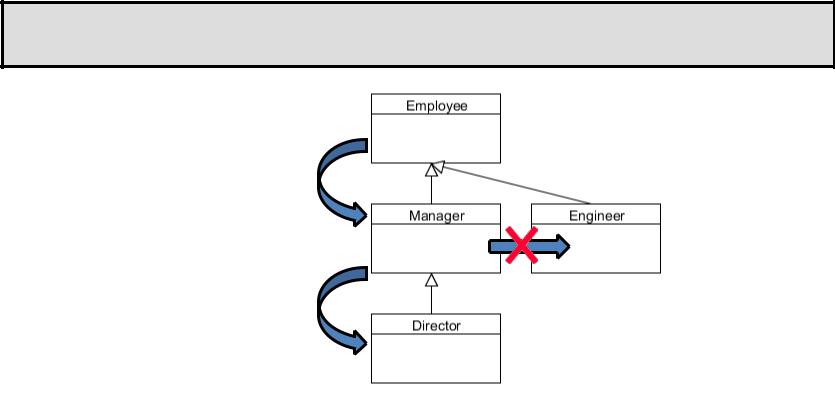
Lectures / lecture4
.pdfExamples
{
int big = 1234567890; float approx = big;
}
{
long a = 10; int b = (int) a;
}
•A widening primitive conversion does not lose information about the overall magnitude of a numeric value.
•A narrowing primitive conversion may lose information about the overall magnitude of a numeric value and may also lose precision and range.

Casting Object References
In order to access a method in a subclass passed as an generic argument, you must cast the reference to the class that will satisfy the compiler:
1public void modifyDeptForManager (Employee e, String dept) {
2if (e instanceof Manager) {
3 Manager m = (Manager) e;
4 m.setDeptName (dept);
5}
6}
Without the cast to Manager, the setDeptName method would not compile.

Casting Rules
Upward casts are always permitted and do not require a cast operator. (widening – неявное восходящее)
Director d = new Director();
Manager m = new Manager();
Employee e = m; // OK 
Employee e = d; // OK
Manager m = d; // OK
Explanation
Parent {int x;}
Child extends Parent{int y;}
Parent p = new Child(); // widening расширение Can refer only to the x
Checks only the type of the variable, compiler cannot predict were it will points
Parent can points to any of the children, but children may point only the same type

Casting Rules
For downward casts, the compiler must be satisfied that the cast is at least possible. (narrowing - явное нисходящее)
Employee e = new Manager();
Manager m = new Manager();
Manager m = (Manager)e;
//Would also work if
//e was a Director obj
Director d = (Director)m; |
Engineer eng = (Engineer)m; |
// fails at run time |
// compiler error |
Explanation
Parent p = new Child();
Child с = (Child) p; // must cast explicitly -
сужение
Connected with the loss of information

Overriding Object methods
One of the advantages of single inheritance is that every class has a parent object by default. The root class of every Java class is java.lang.Object.
You do not have to declare that your class extends Object. The compiler does that for you.
public class Employee { //... }
is equivalent to:
public class Employee extends Object { //... }
–The root class contains several non-final methods, but there are three that are important to consider overriding:
•toString, equals, and hashCode

Object toString Method
The toString method is called to return the string value of an object. For example, using the method println:
Employee e = new Employee (101, "Jim Kern", ...)
System.out.println (e);
– String concatenation operations also invoke toString:
String s = "Employee: " + e;
– You can use toString to provide instance information:
public String toString () {
return "Employee id: " + empId + "\n" "Employee name:" + name;
}
–This is a better approach to getting details about your class than creating your own getDetails method.

Object equals Method
The Object equals method compares only object references.
If there are two objects x and y in any class, x is equal to y if and only if x and y refer to the same object.
Example:
Employee x = new Employee (1,"Sue","111-11-1111",10.0); Employee y = x;
x.equals (y); // true
Employee z = new Employee (1,"Sue","111-11-1111",10.0); x.equals (z); // false!
–Because what we really want is to test the contents of the Employee object, we need to override the equals method:
public boolean equals (Object o) { ... }
